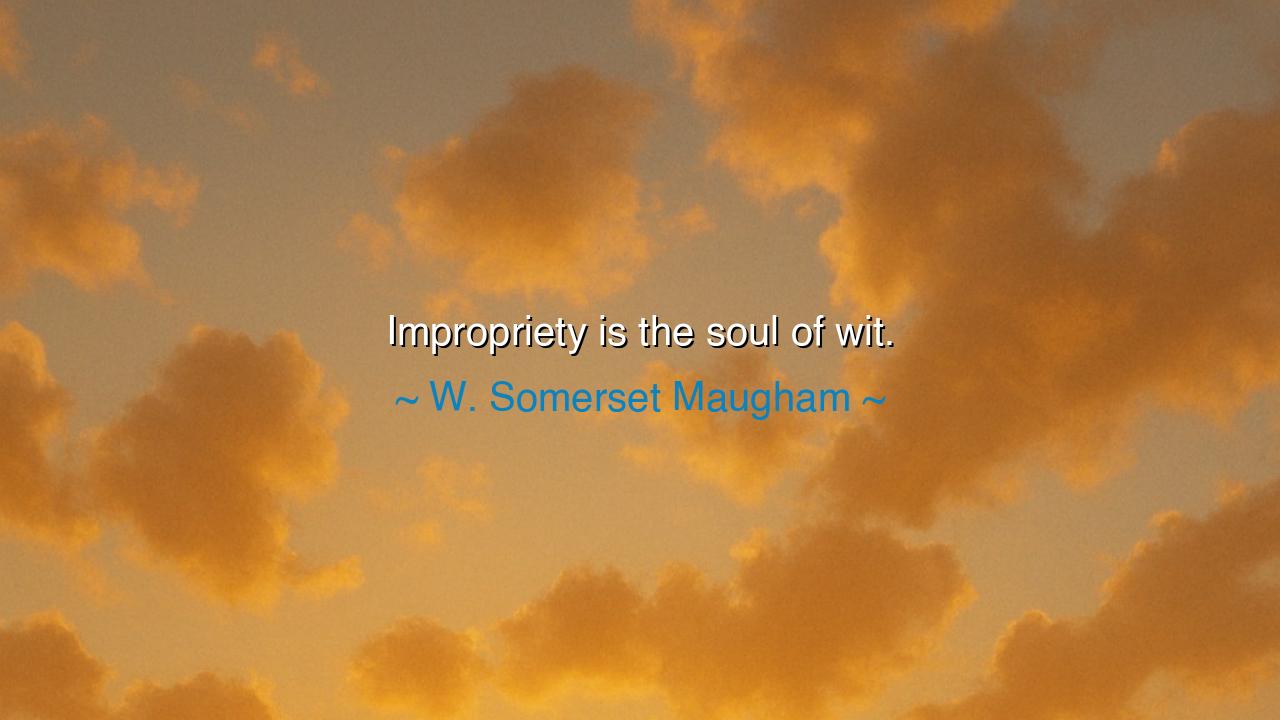
Impropriety is the soul of wit.






Hearken, children of the ages, and attend the wisdom of W. Somerset Maugham, who declared: “Impropriety is the soul of wit.” Know this: true wit does not dwell in the safe and predictable, nor does it flourish in conformity and reverence alone. Its essence lies in the audacious, the unexpected, the unorthodox—the moments where propriety bends, where the mind dares to trespass, and where cleverness meets boldness. In impropriety, the soul of wit finds its spark, and through it, the mind illuminates truths hidden behind decorum and fear.
In the courts of ancient Rome, the orators and philosophers understood this secret. Cicero, while master of rhetoric and decorum, often employed irony, veiled mockery, and daring paradoxes that unsettled his audience. In these moments of subtle impropriety, he revealed truths that polite discourse might have hidden, striking at pride, pretense, and arrogance alike. It was here, in the delicate dance between audacity and insight, that wit truly awakened and exercised its power.
Consider the life of Oscar Wilde, whose epigrams and social critiques dazzled the salons of Victorian England. His wit often skirted the boundaries of propriety, touching upon matters of morality, love, and society that polite society preferred to ignore. It was the very audacity, the slight impropriety, that made his words burn with brilliance. In jest, in paradox, in audacious truth, Wilde exposed folly, revealed hypocrisy, and elevated the conversation, proving that without daring, wit is but a shadow of its potential.
Even in literature, the principle holds. Jonathan Swift, in his immortal satires, wielded impropriety as a weapon to illuminate the absurdities of mankind. In Gulliver’s Travels, he transgressed social and moral conventions, casting kings, scholars, and common men alike into situations that shocked and amused. Through this breach of propriety, the truths of human folly, ambition, and corruption became undeniable. Without impropriety, Swift’s wit could not have penetrated the armor of human pretense.
Yet, the wisdom of Maugham carries a subtle caution: impropriety is not license for malice or cruelty. True wit balances audacity with insight, daring with discernment. It is the clever mind, aware of human weakness and folly, that selects the moment and the measure of impropriety, using it not to wound, but to illuminate. The soul of wit, therefore, is not merely the shock of the unexpected, but the marriage of daring and understanding, boldness and moral perception.
History offers another illustration in the life of Voltaire, who challenged the dogmas of church and state through sharp satire. His writings, at times scandalous to the orthodox, used impropriety to expose hypocrisy, superstition, and oppression. By daring to speak what was feared or forbidden, he taught, amused, and enlightened generations. Here, we see Maugham’s principle lived: the soul of wit thrives not in obedience, but in bold, thoughtful audacity.
Children of the ages, the lesson is clear: cultivate your mind not only with knowledge, but with courage. Seek the spark of impropriety within, the daring to speak truth, to challenge convention, and to illuminate hidden folly. Recognize that wit, in its highest form, is a careful blend of audacity and insight, and that through boldness, one can reveal truths otherwise concealed.
Practical action follows this wisdom. Read widely, observe deeply, and reflect on human foibles with courage and discernment. Practice the art of wit by daring to challenge assumptions, to invert expectation, and to speak truths that others might hesitate to voice. Let your impropriety be tempered with wisdom, your audacity guided by understanding, so that in speech and thought, your wit may shine as Maugham teaches: bold, penetrating, and alive with the spark of insight.






AAdministratorAdministrator
Welcome, honored guests. Please leave a comment, we will respond soon